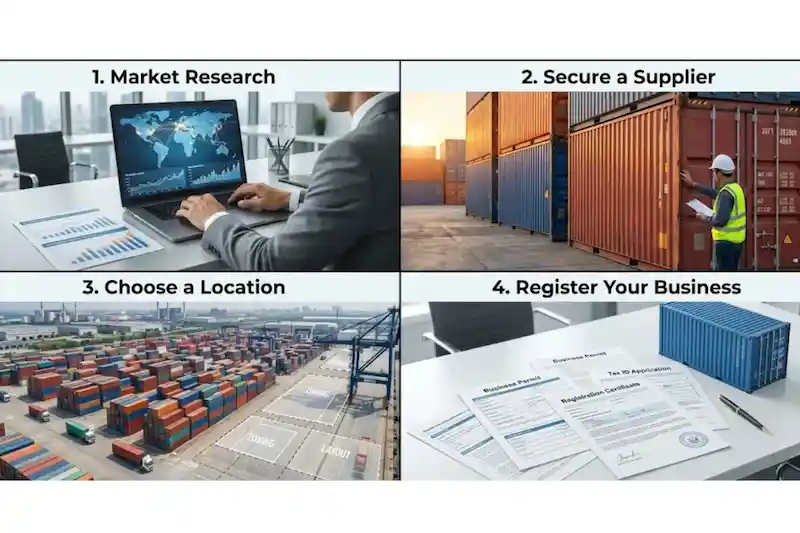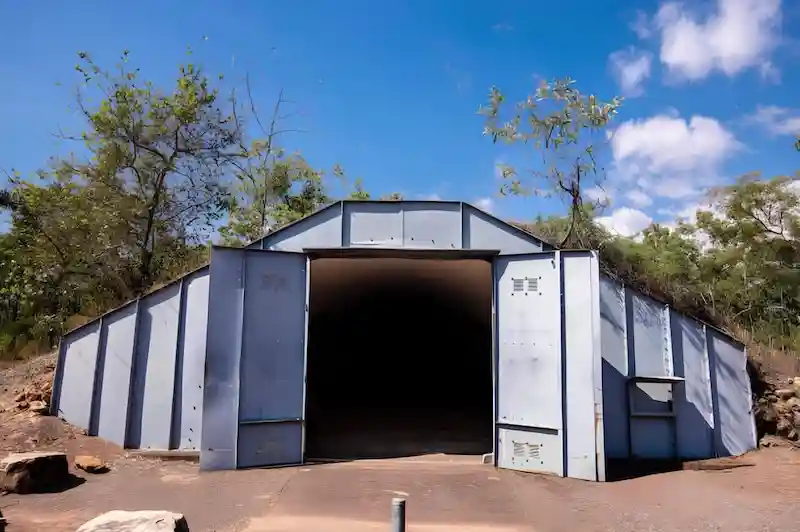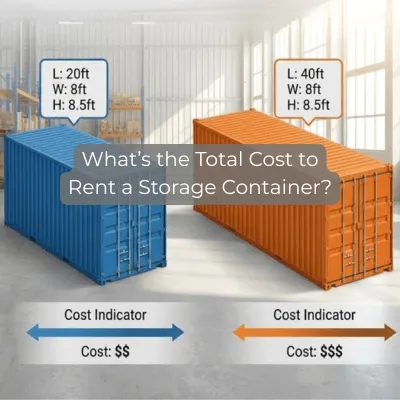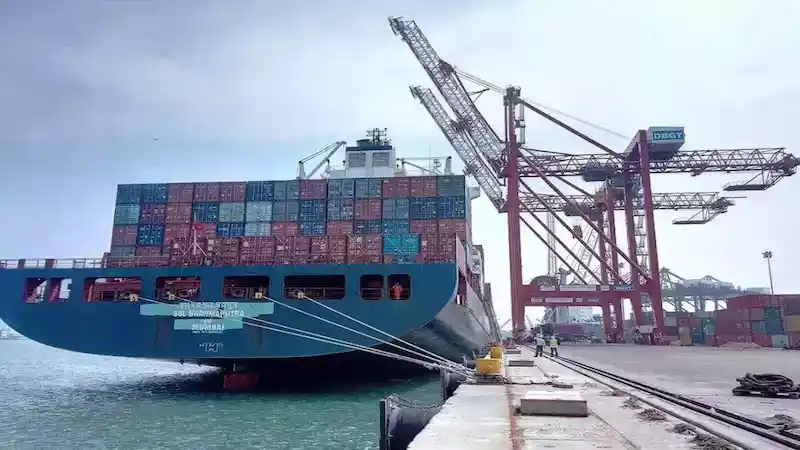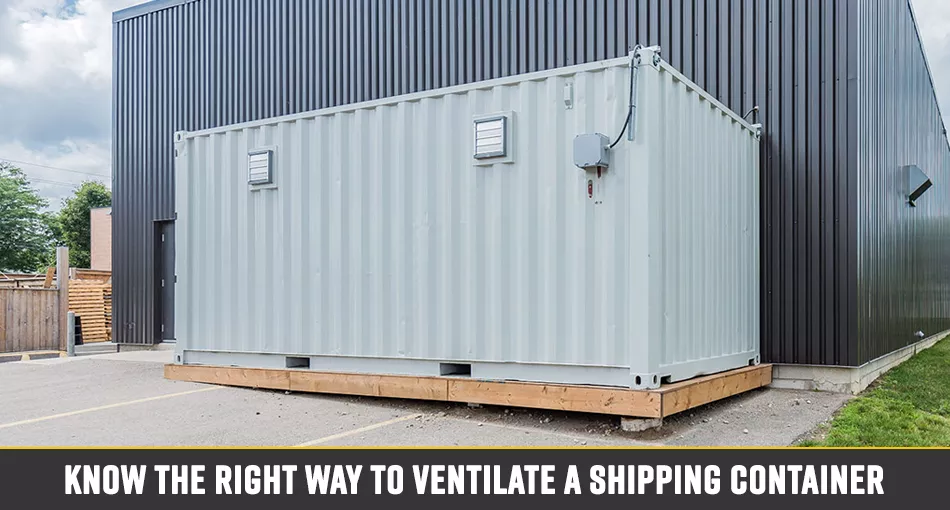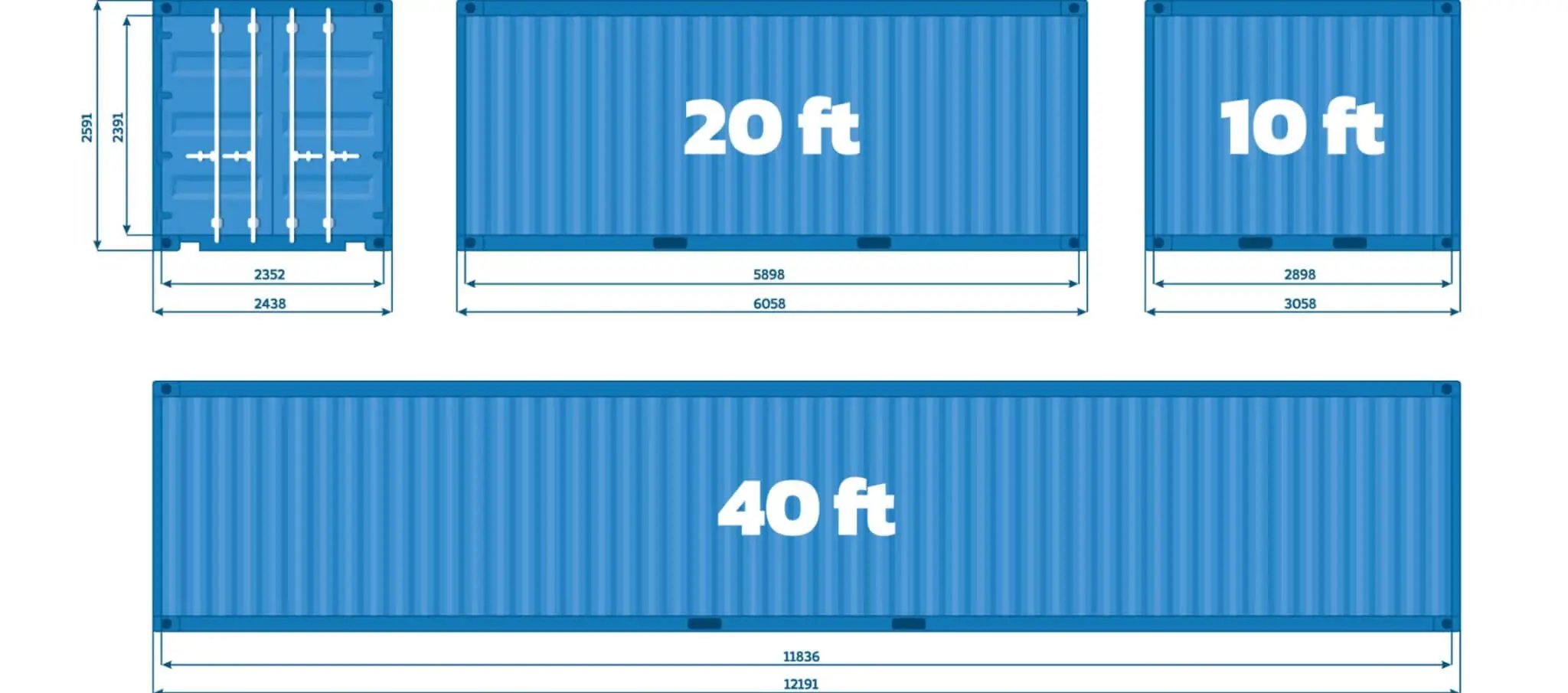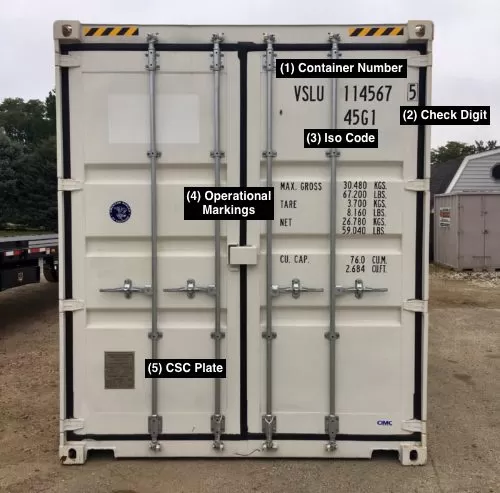How to Start a Container Business – 2025 Path to Trading Success

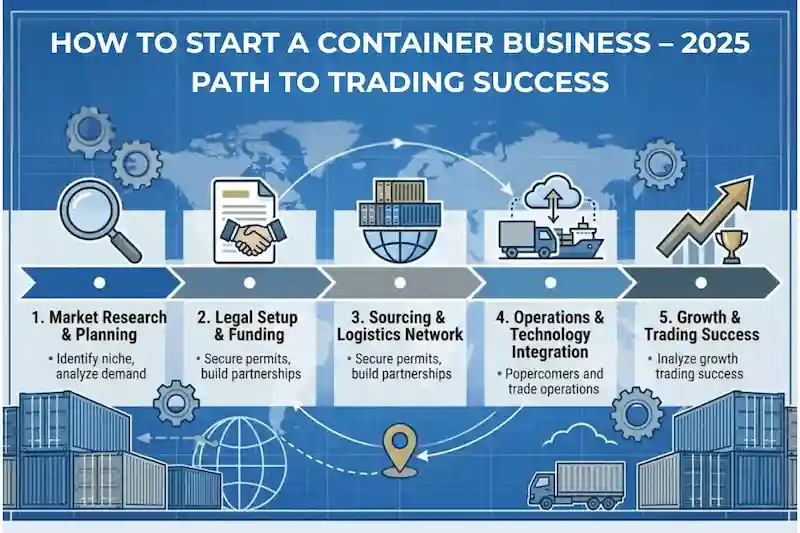
Starting a business with shipping containers might sound straightforward, but it takes more than just buying a few metal boxes and looking for buyers. The container industry is built on smart trading, logistics, and knowing how to turn steel units into profitable assets. Whether you plan to sell, lease, or repurpose containers, the right strategy can turn a simple investment into a long-term income stream. This guide will break down the most profitable ways to work with containers and what it takes to build a successful business.
Top 5 shipping container business ideas: turn a profit with containers
Moving goods across the ocean is not the only purpose for shipping containers. These steel boxes have become valuable assets in different industries, from construction to retail. If you’re thinking about starting a container business, here are five ways to make money with it.
1. Buy and sell containers: container trading business
Probably the simplest idea related to container business is to buy and sell them. Like any asset on the market, prices for containers fluctuate, and by keeping tabs on the trends, a trader can gain an advantage. For example, a 20ft shipping container can be bought at a competitive price and put on sale when demand spikes. Also, keep in mind that different types of containers bring different opportunities. For example, a 40-ft high cube container offers more space, making it attractive for businesses needing extra storage. Moreover, modifying a container will increase its selling price.
To succeed in container trading, check market prices, connect with reliable sellers, and build a network of buyers. A good marketplace will give you access to the right deals, helping you scale your business faster.
2. Container storage business
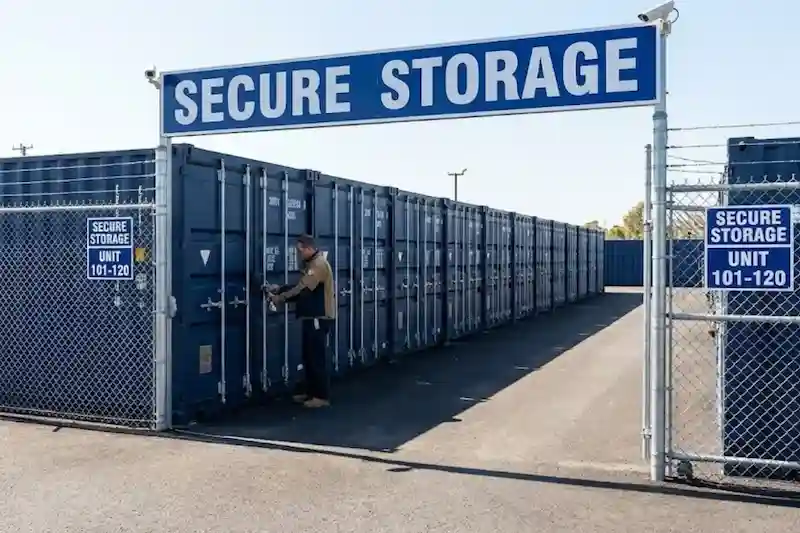
Companies and individuals constantly need storage solutions. Renting out shipping containers for storage is a profitable idea, especially in areas where warehouse prices are high. A simple setup involves buying a few units, placing them on a rented lot, and leasing them out.
A 20ft standard container is a popular choice for storage businesses because of its manageable size. You can target small businesses, contractors, and even people who need temporary storage during a move.
Prioritize a location with easy access and a good level of security. You may set a higher price if your containers include additional features. For instance, charging extra for climate-controlled containers or reinforced locking systems is fair.
3. Container business for construction companies and builders
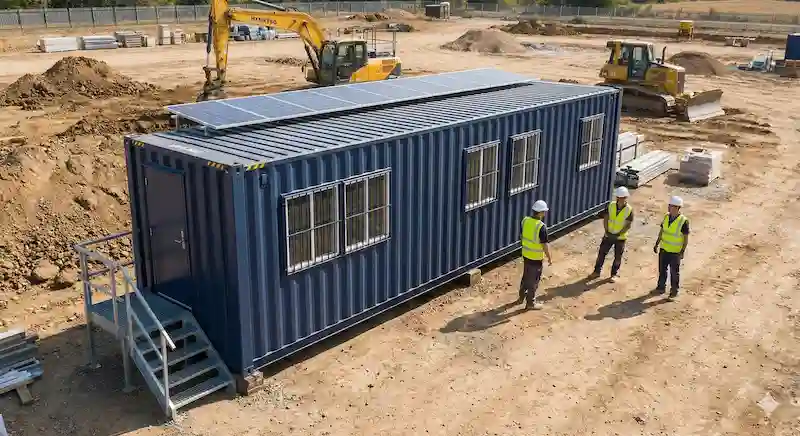
Containers will never get old in construction. They are always needed for temporary offices on-site, equipment storage, and even housing for workers. That’s why builders want durable yet portable options like 40-ft HC open-side containers, which provide comfortable access due to their design.
You can also convert containers into mobile offices with basic insulation, ventilation, and power supply. Builders and contractors will pay a good price for a ready-made solution.
4. Buy, reposition, and sell containers
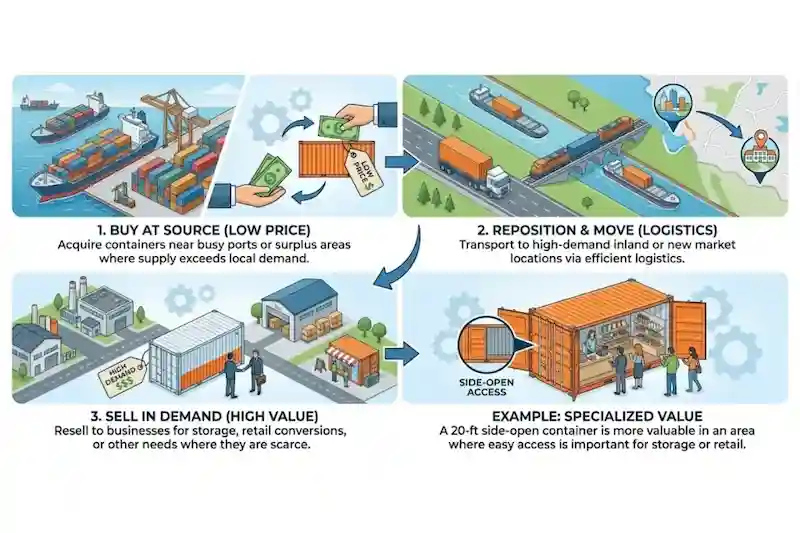
Sometimes, containers are available in one location at a low price but in high demand somewhere else. This creates an opportunity for those willing to buy, move, and resell them. It’s all about understanding the logistics and finding the right buyers.
For example, you might find cheap containers near a busy port and move them inland, where businesses need them for storage or retail conversions. A 20-ft side-open container can be more valuable in an area where easy access is important.
5. Shipping container leasing business

Instead of selling, you can lease containers to companies that need them for short-term use. The advantage of leasing is the steady income it generates. Businesses involved in seasonal storage, moving, or international trade are always looking for rental units.
A platform that connects lessees with container owners can help automate the process. If you have multiple units, partnering with a larger leasing company can bring in consistent clients. The key is setting a competitive leasing price while maintaining the quality of your inventory.
How to start a shipping container business
Getting started requires more than just buying containers and hoping to sell them at a profit. You need a plan, a reliable source of containers, and a way to move them to customers. There are also legal and logistical factors to consider. Whether you want to trade, lease, or modify shipping containers, the steps below will help you build a solid foundation.
1. Research the market
Preparation is the key to your business, like a solid foundation is to a house. That’s why you need to explore the field before playing the game. Check the competitors, search for container marketplaces, local dealers, international suppliers, etc. Pay attention to location and global shipping trends because they affect the demand as well as prices. Check what kinds of industries at your target location are prevailing and what kind of container they may prefer: more spacious options like 40ft high-cube containers or more compact ones. The more you understand demand, the better you can position yourself in the market.
2. Secure a supplier
Finding a reliable supplier is one of the most important steps. Some traders buy containers directly from shipping lines, while others rely on depots or large-scale resellers. A 20ft shipping container is a good entry point since it fits multiple purposes, from personal storage to business use. It’s also not superfluous to inspect the units before purchasing and compare prices from different sellers to get the best deals.
3. Find a suitable location
Location is extremely important, especially when dealing with container storage and leasing. The reason for this is that being situated near industrial zones, seaports, or transport hubs will make container transportation faster and easier. Additionally, it will form additional demand for your items from potential customers nearby.
You may need a vast space to store your containers, and for that, working with third-party depots may be a good practice to reduce overhead costs. Moreover, make sure that the land you’re planning to use is legally zoned for storage and business operations. Regarding legality…
4. Register your business
Each region may have its unique legal requirements, but registration is what is typically needed everywhere. Get a tax ID and gain the permissions needed. If a storage yard is what you’re planning to operate, check environmental regulations because some areas may pose restrictions on the number of stored containers in open lots. Business insurance is also a must, especially if you’re handling large inventories or leasing containers to clients. What are other businesses charging? Where is the demand highest? A good starting point is to analyze platforms where containers are listed for sale or lease.
4 Things to Keep in Mind When Starting a Shipping Container Business
Starting a shipping container business isn’t just about finding buyers and sellers. There are factors that can make or break your success. Paying attention to these key points will help you avoid common mistakes and increase your chances of making a profit.

1. Pricing Fluctuations
Container prices aren’t fixed. The cost of steel, global shipping rates, and supply chain disruptions all affect how much you’ll pay. In peak demand periods, prices go up, while economic downturns might create buying opportunities. Smart traders watch market trends and buy when prices are lower to maximize profit when selling.
2. Competitors
Container trading isn’t a new business, and you’ll be competing with established companies. To stand out, you can focus on a niche — whether that’s specializing in refrigerated containers, modified units, or bulk deals. Offering add-ons like repainting, lockbox installations, or delivery services can also help attract customers.
3. Partnerships Matter
Building strong relationships with suppliers, transport companies, and buyers will help you scale your business. A logistics partner can give you better shipping rates, while a bulk supplier might offer discounts for repeat orders. The more connections you have, the easier it becomes to buy and sell at profitable rates.
4. Condition of Units
Not all containers are equal. New, one-trip, and used containers have different price points and target customers. While used units may be cheaper, this difference in price may come with collateral effects like rust, dents, or other structural issues that will require attention. That’s why you need to inspect containers before purchasing or work with reputable sellers like Pelican Containers. The price may be affected by other factors, like global trade disruptions, metal prices, and shipping trends, so timing your purchase correctly can provide relief for your budget.
With that being said, a container business is not just about selling and leasing units. The real game is in understanding the market, knowing where to get the best deals, and making smart moves with pricing and logistics. Some businesses thrive on volume, others on niche modifications. The money is there for those who do their research and act at the right time. Whether you start small with a few units or go all-in on leasing and conversions, a container business can be a strong investment if handled the right way.
Vanessa is a dedicated writer and content enthusiast at Pelican Containers. With a background in practical writing and a keen eye for clarity, she transforms complex container topics into easy-to-understand and useful content. Her passion lies in exploring the evolving world of container usage — from smart storage hacks to global logistics trends.
When she's not writing, Vanessa loves discovering creative shipping container projects or traveling to find new inspiration.
Explore thoughtful, informative, and accessible content with Vanessa!
Vanessa is a dedicated writer and content enthusiast at Pelican Containers. With a background in practical writing and a keen eye for clarity, she transforms complex container topics into easy-to-understand and useful content. Her passion lies in exploring the evolving world of container usage — from smart storage hacks to global logistics trends.
When she's not writing, Vanessa loves discovering creative shipping container projects or traveling to find new inspiration.
Explore thoughtful, informative, and accessible content with Vanessa!
FAQ
Is container business profitable?
Yeas, it can be profitable. It depends on what part you’re in — selling, modifying, or using them for storage. If you get containers cheap, find steady demand, and keep overhead low, there’s decent money. But it’s important to remember the challenges: market swings, maintenance, and logistics complications.
How much does it cost to start a shipping container business?
It could be anywhere from $5K to over $50K. A single used 40-foot container might cost a few thousand bucks, then you need land, a truck (or hire one), maybe a forklift, permits, and marketing. If you’re modifying them into offices or tiny homes, costs go up fast.
How to make money off a shipping container?
Several ways to use shipping containers for making money would include renting them out as storage units, reselling them, modifying them to increase their selling price, and leasing containers to construction companies. Ultimately, this depends on demand in your area and how creative you get.
Why is the container business so slow?
Shipping demand dropped after the pandemic boom. Too many containers sitting around. Fuel prices are up, global trade is shaky, and interest rates are high. People aren’t buying or moving as much stuff, so the whole chain drags.
Is the container going out of business?
The container isn’t going out of business. There will always be a need for moving and storing goods.
How much does a 40 shipping container cost?
Used containers usually cost around $2,500–$4,000. The price for new models typically ranges from $5,000 to $8,000 or more. Prices swing hard based on condition, location, and market mood. You’ll pay more if you’re far from a port or during a supply crunch.


